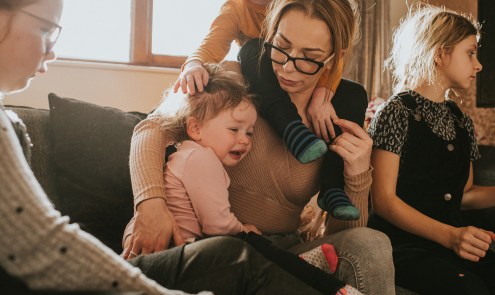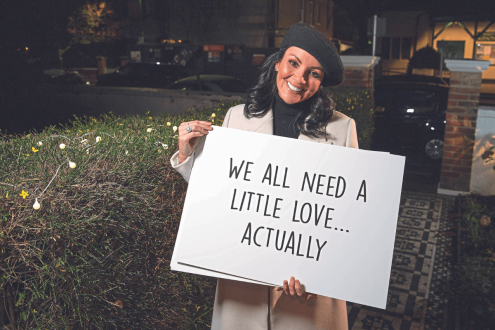Living with vulvodynia
A mysterious condition made life miserable for Rebecca Pearson. With acute, unexplained pain in her genitals, sex was out of the question and she felt like a failure as a woman. At last, she got a diagnosis, and shares her story to help the many other women suffering from the syndrome, and the emotions it brings

Around two years ago, I was diagnosed with vulvodynia, which is unprovoked chronic pain in the vulval region. It was deeply embarrassing and unsexy, and made me feel as if I was faulty: intimacy, using tampons, dating and even wearing skinny jeans became obstacles. The shame is lessening as I learn to talk about it, however, and also as I discover that a large number of women can relate to my story.
The straw that broke…
A few weeks before the diagnosis, on a cold February afternoon, I sobbed, “I just can’t take it any more!” into the arms of my surprised father. Severe, recurrent thrush had assailed me for years and I had been bleeding for months from yet another contraceptive pill that didn’t agree with me. When the blood flow occasionally ceased, I was unable to have sex because of an ever-present sensation of having paper cuts around my vagina, which was heightened by physical contact. Valentine’s Day would be ruined. My poor boyfriend’s patience would surely soon run out.
For years, I’d gone to countless GP appointments, only to be told that I was fine. It sometimes made me wonder if I was imagining it. According to Fiona Lewis, the consultant dermatologist who finally diagnosed me, this problem is all too common: ‘Vulvodynia is very poorly recognised,’ she says. ‘Unfortunately, it can take years of repeated visits to different specialists, often with unnecessary tests, before the diagnosis is made. Because the vulva looks normal when examined, many women are told to live with it, or worse, that it is “in their head”, which leads to many other issues. Some patients are then told there is no treatment.’ She quickly ascertained my condition by pressing a cotton bud to various points: a screeching pain on one spot made me recoil.
A baffling intruder
All those years of thrush had affected my nerves, which still registered pain even though I’d been free of infection for months. I’ve learned that vulvodynia is not a straightforward condition: one gynaecologist told me of a patient who had witnessed an horrific motorbike crash and felt as though the trauma had been channelled straight to her vagina – she had suffered from vulvodynia ever since. For others, it can appear suddenly and randomly without a trigger.
My withering sex life
Anaesthetic ointment. Pain killers. Reiki. Acupuncture (believe me, a needle to the perineum will never be fun). I trawled forums for miraculous remedies and gave everything a go. Though it lessened, the pain continued and, eventually, it was me who broke up with my then-boyfriend. Although there were many factors involved, a potent mix of guilt (at my lack of enjoyment of sex) and resentment (that he brought on that agony) certainly contributed. I jumped quickly into a new relationship and hoped my condition would just disappear; the rush of excitement overriding any pain factor.
But of, course, it didn’t. In fact, it got worse: a stressful year of personal loss, a severe bout of eczema causing actual cuts on my vulva and a new feeling of constant nausea led to me avoiding all forms of intimacy. I didn’t just feel broken down, I felt like a failure as a woman and, despite costly therapy, the new relationship didn’t last. Psychosexual therapist Olivia Luna assures me that these are understandable reactions: ‘Sexual pain may result in a negative body image, whereby a woman can develop distorted beliefs about her genital area being “damaged”. The preoccupation with sexual pain distracts a woman from her own pleasure during sex and may lead to sexual avoidance or aversion. This will inevitably affect the relationship and a partner may feel rejected.’ This rings true. Though I know I’m a kind, affectionate girlfriend, I had tunnel vision about how I was burdening boyfriends with my never-ending gynaecological dramas. Why would anyone want to be with a wreck like me?
The turning point
Thank goodness for my second appointment with Dr Lewis. Despite feeling overwhelmed by the condition, my pain response had lessened from eight out of 10 to three, but she noted that my pelvic floor needed physiotherapy as a result of my constant clenching away from contact. This is where, thankfully, my arduous path entered the light. I was astounded by the empathetic treatment I was shown on the simple NHS course of physiotherapy, and it was amazing how quickly I improved in only six sessions. At the start, a gentle internal examination with a single gloved finger sent my parasympathetic nervous system into overdrive: I cried, my blood pressure dropped, I nearly fainted and my sweaty hands furled at odd angles. However, homework of stretches, self-massage and, eventually, a dilator helped my pelvic floor, as did bombarding the damaged nerves with touch, so they no longer falsely reported pain. Incredibly, I was not subject to the whims of ‘unexplained’ pain any more.
Lessons from adversity
Although recurrence of vulvodynia is rare, I feel emboldened that I can return to the NHS and get both physiotherapy and psychotherapy; a safety net that I’m grateful for because, in my experience, the physical symptoms and psychological patterns of the condition must be treated in harmony.
Vulvodynia is an upsetting syndrome. Not only is there discomfort and vulnerability but, as a young person who has grown up in a society that, I believe, encourages us to be sexually eager and available, I felt I was a letdown. I can also see where my mindset contributed to my problems: I threw anything and everything at my condition, desperate for a quick fix. I pushed down feelings of discomfort and buried them with my own pressure and guilt; not telling boyfriends what I needed and hoping they wouldn’t notice me flinching from pain when they touched me. For a while, it was like being aboard a runaway train, but I now feel in full ownership of myself, fanny and all! I shall have no qualms about sharing this with my next partner because, if he can’t handle my truth, then that really is his problem.
It might not have been the ideal way to learn, but vulvodynia has forced me to take the time and space I needed in order to connect to – and deeply respect – my body and my mind.
Read more about Rebecca Pearson here.
Image: Getty








